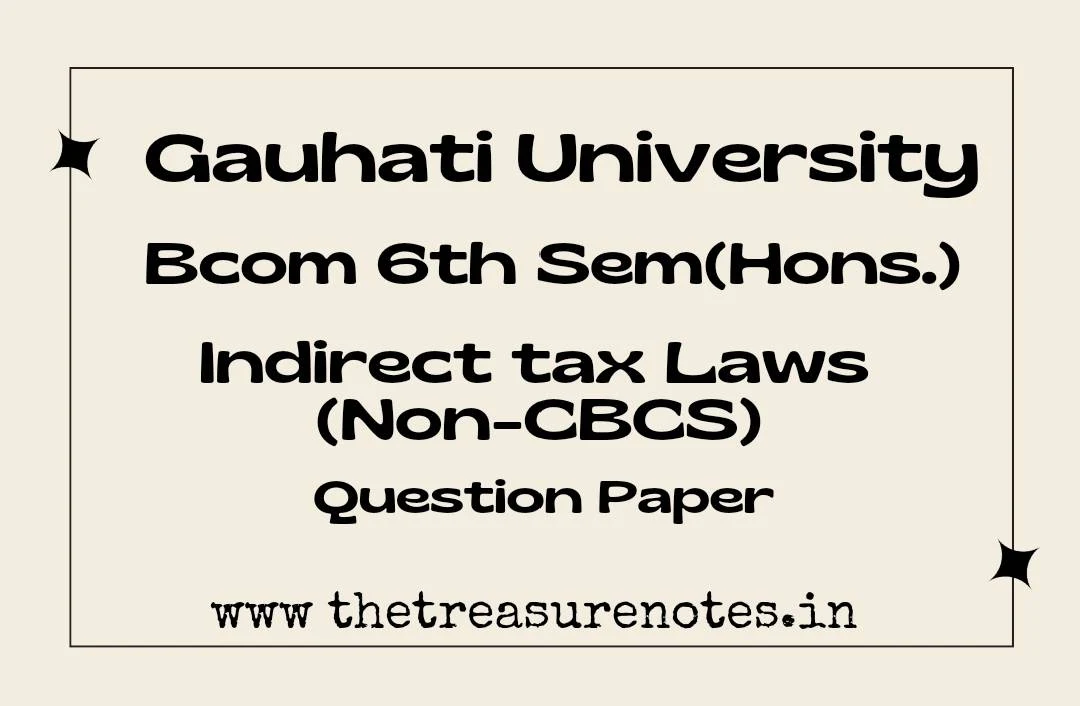In this Post we have uploaded Gauahti University Indirect Tax Laws Question Paper 2013 Non-CBCS, B.Com 6th Sem. which Can be Very Useful For Your GU B.Com 6th Semester Sessional or Final Examination.
Gauhati University Question Papers
INDIRECT TAXATION
(May-June’ 2013)
Full Marks: 80
Time Allowed: 3 hours
Answer either in English or Assamese
gauhati university indirect taxation question papers 2013
The figures in the margin indicate full marks for the questions
1. Answer the following as directed: 1x10=10
a) Both registered and unregistered dealers can collect tax under Central Sales Tax Act. (State whether the statement is true or false)
b) Excise duty is levied on the manufacturer of excisable goods in India. (State whether the statement is true or false)
c) The Assam Value Added Tax Act, 2003 came into effect from 1st day of April, 2005. (State whether the statement is true or false)
d) Skin of animals is prohibited goods under the Customs Act, 1962. (State whether the statement is true or false)
e) Submission of Form _____ is mandatory to avail concessional rate of Central Sales Tax. (Fill in the blank)
f) Central Excise duty is levied and collected by the Central and State Government. (State whether the statement is true or false)
g) The term ‘dealer’ has been defined as per Section _____ of the Assam Value Added Tax, Act, 2003. (Fill in the blank)
h) “Goods” does not include newspapers and shares under the Central Sales Tax Act. (State whether the statement is true or false)
i) Basic Excise duty is also known as Cenvat as per rule 2A of the Central Excise Act. (State whether the statement is true or false)
j) According to Section 2(53) of the Assam VAT Act, 2003, “taxable goods” means goods other than tax-free goods. (State whether the statement is true or false)
Also Read:
- GU Indirect Tax Laws Question Paper 2022
- GU Indirect Tax Laws Solved Question Paper 2022
- GU Indirect Tax Laws Question Paper 2023
- GU Indirect Tax Laws Solved Question Paper 2023
2. Explain the following in brief: 2x5=10
a) ‘Dealer’ as per Central Sales Tax Act.
b) Meaning of ‘Excisable goods’ as per Central Excise Act.
c) ‘Dutiable goods’ as per Customs Act, 1962.
d) Two advantages of Value Added Tax (VAT).
e) ‘Coastal goods’ as per Customs Act, 1962.
3. Describe briefly any four of the following: 5x4=20
a) Features of the Central Sales Tax Act.
b) Persons exempted from registration under Central Excise Act.
c) ‘Prohibited goods’ under the Customs Act, 1962.
d) Meaning and objectives of Tax payer Identification Number (TIN) under VAT.
e) Essential features of Inter-state sales under the Central Sales Tax Act.
f) Meaning of ‘Manufacturer’ and ‘Wholesaler Dealer’ as per Central Excise Act.
4. Explain the procedure of payment of central sales tax by a dealer under Central Sales Tax Act. 10
Or
What is meant by compulsory registration as per Central Sales Tax Act? Explain the advantages of registration under this Act. 2+8=10
5. Define ‘Sale’ and ‘Purchase’ under Central Excise Act. Who are the persons requiring registration under this Act? 2+8=10
Or
Explain the procedure of registration under the Central Excise Act. 10
6. What is meant by ‘Imported goods’ as per Customs Act? Describe the procedure of clearance of imported goods for home consumption under this Act. 2+8=10
Or
Describe different types of Custom duties under the Customs Act. 10
7. Explain the features of Value Added Tax. Who are the persons liable to pay tax under the Assam VAT Act? 5+5=10
Or
What is VAT? State the rates of Value Added Tax applicable to various commodities under the Assam VAT Act. 2+8=10
***

